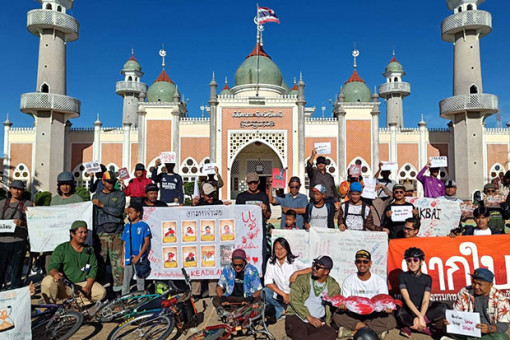Parliamentarians fret about possible unrest in South as statute of limitations nears expiry

Lawmakers, human rights activists and families hoping to see justice for the victims of the 2004 Tak Bai tragedy were offered nothing more than a debate in parliament on Friday as the clock ticked towards the expiry of the statute of limitations.
The 20-year statue of limitations for criminal charges in connection with the event that took 85 lives in southern Thailand will end after 11.59pm on Friday.
None of the seven defendants, including former Army Region 4 commander Gen Pisal Wattahawongkiri, has come forward to fight the court case so far. Until recently Gen Pisal was also an MP for the governing Pheu Thai Party.
“This time twenty years ago, the crackdown on protesters began,” Romadon Panjor, a list-MP of the People’s Party said in a Facebook message with a black banner at 3.30pm on Friday.
He and Kamolsak Leewamoh, a Narathiwat MP for the Prachachat Party, rose in the House of Representatives to submit an urgent motion through a verbal process to address the issue.
“I am deeply worried about the situation in the southern region,” Mr Kamolsak said, citing a blast in Panare district in Pattani on Thursday as an example.
Mr Kamolsak warned that the unsatisfactory end to the Tak Bai case could deepen and widen rifts in the southern border region if “wrongdoers are left unpunished and justice is not served.”
Pheu Thai list-MP Prayut Siripanich led a number of party MPs to try to prevent the issue from being raised but they failed to shoot down the motion, according to INN news agency.
On Oct 25, 2004, seven Muslim protesters were killed during a rally in front of the Tak Bai police station in Narathiwat province. Another 78 were suffocated to death during transport from the demonstration site to the Ingkayutthaboriharn army camp in Nong Chik district of Pattani.

Women in Krong Pinang district of Yala display a banner demanding justice for the victims of the Tak Bai massacre. (Photo: Abdullah Benjakat)
After the incident, years passed with few signs of any attempt by successive governments — civilian or military — to pursue those responsible for the tragedy. It was not until August this year that victims’ families and activists finally succeeded in bringing a case before the Narathiwat Provincial Court.
The case named seven people as the accused. They are:
- Gen Pisal Wattanawongkiri, then Army Region 4 commander
- Maj Gen Chaloemchai Wirunpetch, then 5th Infantry Division commander
- Pol Gen Wongkot Maneejan, then director of the operations centre, Royal Thai Police front office
- Pol Lt Gen Manoj Kraiwong, then chief of Provincial Police Region 9
- Pol Maj Gen Saksommai Phutthakul, then superintendent of the Tak Bai police station
- Siwa Saengmanee, then deputy director of the Southern Border Provinces Peace Centre
- Wichom Thongsong, then Narathiwat governor.
Public prosecutors later agreed to indict a second group comprising eight people in a case before the Pattani Provincial Court. They were involved in the deadly transport process. The case has not yet reached the court.
The defendants are:
- Maj Gen Chaloemchai Wirunpetch, then 5th Infantry Division commander
- Lt Col Prasert Mattamin
- Sub Lt Nutthawut Luamsai
- Wissanu Loetsongkram
- Lt JG Wissanukorn Chaisarn
- Piti Yarnkaew
- CPO3 Ratchadet Sisuwan
- Lt Ritthirong Promrit.
Maj Gen Chaloemchai is named in the two groups. The military and police ranks of the suspects were as of the time of the massacre.
Arrest warrants for all the accused in the two groups were issued but authorities have not found or arrested any of them. Many are believed to have flown abroad or slipped across the border to wait out the statute of limitations.
The massacre took place when Thaksin Shinawatra, the father of present premier Paetongtarn, was the prime minister. Thaksin apologised for the incident two years ago but did not accept responsibility. The commander-in-chief of the army at the time was Gen Prawit Wongsuwon, who continues to play a prominent role in Thai politics today.
The UN Human Rights Special Procedures group on Thursday issued a statement expressing concern about the possibility of the wrongdoers walking free.
“We welcome the fact that two criminal cases are finally proceeding into this incident with arrest warrants issued against relevant current and former officials,” the statement said, citing the opinions of the UN human rights experts.
“However, we are extremely alarmed that without further action, these will end prematurely when a statute of limitations expires on Oct 25, 2024.”
Thailand last month won a seat on the UN Human Rights Council after years of lobbying.
Other human rights advocates have demanded justice for the victims and put pressure on the government to do more.
Solemn remembrance
About 30 cyclists arrived on Friday at the Ingkayutthaboriharn army camp in Pattani after pedalling from the rally site in Tak Bai, about 85km away, to call for justice.
“We have ridden our bikes from Tak Bai in remembrance of those who died during transport to the camp,” said Anus Pongprasert, a representative of the cyclists.
“They were in the (Ramadan) fasting period. They didn’t have date palms or water to drink. And they didn’t have oxygen to breathe.”
Prime Minister Paetongtarn on Thursday offered an apology for the Tak Bai deaths. Pheu Thai MP Prayut Siripanich said on Friday that it was unfair for her to take responsibility since she was only 18 years old at the time, according to INN.
Muhamahsawari Useng, who lost his elder brother in the bloody crackdown, said at a forum on Tuesday that the families and relatives of the victims had questions left unanswered over the past two years and urged all defendants to fight in court.
“When the law is seen as the law for authorities, the villagers are suffering even more because the defendants escape the judicial process,” he said during a forum organised by the Cross Cultural Foundation and Asia Justice and Rights.

